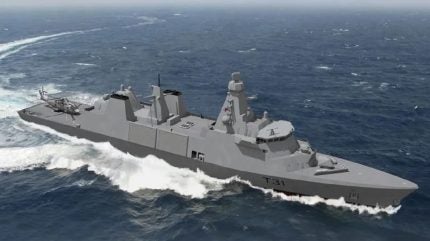
Steel has been cut on the third-in-class Type 31 frigate, the future HMS Formidable, at Babcock’s Rosyth shipyard, with a further two hulls planned to provide a five-strong fleet of general-purpose warships for the UK Royal Navy.
The symbolic first steel cutting represents the symbolic start of manufacture for a warships, with the ceremony for HMS Formidable coming 20 months after the build programme got underway for the second Type 31, HMS Active.
The first Type 31 Frigate, HMS Venturer is nearing structural completion, with the final unit now added to the vessel within the Rosyth assembly hall alongside HMS Active, Babcock stated in a 9 October release.
Babcock’s CEO, David Lockwood, said: “This programme is a real demonstration of UK sovereign shipbuilding capability and is delivering positive economic impact within Scotland and in communities across the UK.”
The Type 31 build programme, which saw Babcock handed the responsibility to build five new frigates for the Royal Navy, is centre to wider investment in the Rosyth area, with the company stating that it would create 1,000 new roles at the site over the next four years.
The majority of these new roles, including over 100 new apprentices and graduates who joined the company this year, will support the Type 31 programme over the lifetime of the project.
Minister for the Armed Forces Luke Pollard, attending the steel cutting ceremony, said the Type 31 frigate would be “at the heart” of the Royal Navy’s future fleet.
The Type 31 design, which is based on the Danish Iver Huitfeldt-class frigates in service with the Royal Danish Navy, has also been exported to Poland and Indonesia.
Doubts over UK ability to manufacture steel for warships
The recent cessation of the blast furnaces at Port Talbot steelyard in Wales in September 2024 has further reduced the UK’s ability to manufacture steel, particularly to the grades required for use in naval surface and subsurface combatants.
According to a January 2024 statement from the GMB union, the UK would be left “woefully underprepared” for any potential conflict should steel blast furnaces close. Up to 3,000 jobs are expected to be lost with the cessation of activity at Port Talbot.
New, or virgin, steel can only be made using the UK’s four blast furnaces – two at Port Talbot and two at Scunthorpe, the GMB said.
“We are on the brink of losing our full ability to make our own steel, vital to our defence industry – not least in building warships. It’s utter folly,” Matt Roberts, GMB national officer, said at the time.
The GMB contends that the planned electric arc furnaces that will eventually replace the blast furnaces at Port Talbot will not be able to manufacture steel to the standard required for military use, as it works only to recycle existing steel.
In July 2024, the UK signed the latest element of its wider AUKUS submarine programme partnership with Australia at Sheffield Forgemasters, a specialist manufacturer of steel that is wholly owned by the UK Ministry of Defence following a £900m ($1.1bn) rescue investment.
Sheffield Forgemasters will manufacture highly complex, nuclear grade steel for components in nuclear-armed submarines, as well as for the SSN-AUKUS submarines.







